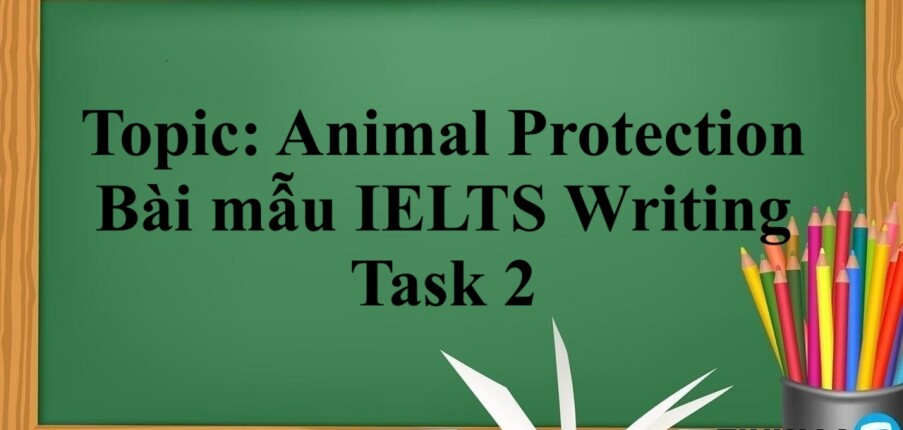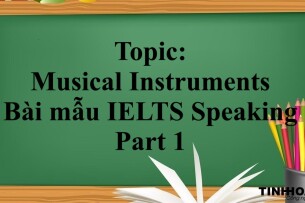Topic: Animal Protection | Bài mẫu IELTS Writing Task 2
Phân tích
1. Phân tích đề bài
Đề bài:
Many animals are endangered. Some people argue that we should only protect animals that are useful to humans. To what extent do you agree or disagree?
Nhiều loài động vật đang có nguy cơ tuyệt chủng. Một số người cho rằng chúng ta chỉ nên bảo vệ những loài động vật có ích cho con người. Bạn đồng ý hay không đồng ý?
=> Đề bài này thuộc dạng Agree or Disagree.
Xem thêm: Cách làm dạng bài Agree or Disagree IELTS Writing Task 2 (kèm bài mẫu)
2. Dàn ý
Introduction:
- Trong những năm gần đây, mối lo ngại về các loài động vật có nguy cơ tuyệt chủng đã gây ra những cuộc tranh luận về việc liệu chúng ta có nên ưu tiên bảo vệ riêng những loài có ích cho con người hay không.
=> The concern about endangered animals has triggered debates over whether we should prioritize protection exclusively for species useful to humans.
- Đưa ra quan điểm cá nhân: Tuy nhiên, tôi tin rằng quan điểm này bỏ qua vấn đề đạo đức về bảo vệ tất cả các loài có nguy cơ tuyệt chủng, bất kể lợi ích của chúng đối với nhân loại.
=> However, I believe this perspective overlooks the moral imperative to protect all endangered species, regardless of their utility to humanity.
- Body 1: Biện chứng số một:
- Khái niệm về lợi ích mang tính chủ quan và có thể thay đổi theo thời gian. Những gì có vẻ không cần thiết ngày nay lại có thể mang lại giá trị chưa từng thấy cho thế hệ tương lai.
=> The concept of utility is subjective and can change over time. What may seem nonessential today might hold untold value for future generations.
- Ví dụ: nọc độc của quái vật Gila, một loài thằn lằn được một số người cho là vô dụng, đã mang lại sự phát triển các loại thuốc điều trị bệnh tiểu đường.
=> For instance, the venom of the Gila monster, a lizard considered non-useful by some, has led to the development of medications for diabetes.
- Body 2: Biện chứng số hai:
- Đa dạng sinh học rất quan trọng cho sự ổn định của hệ sinh thái. Việc loại bỏ một loài sẽ phá vỡ hệ sinh thái và gây ra những hậu quả sâu rộng đối với sức khỏe hệ sinh thái và nguồn tài nguyên sẵn có.
=> Biodiversity is crucial for ecosystem stability. Removing a species disrupts ecosystems and has far-reaching consequences for ecosystem health and resource availability.
- Hãy xem xét tới những con ong mật. Mặc dù lợi ích trực tiếp của chúng có thể không rõ, nhưng những loài thụ phấn này rất quan trọng trong nông nghiệp, hỗ trợ sự phát triển của nhiều loại cây trồng thiết yếu như trái cây, rau và các loại hạt.
=> Consider honeybees. While their direct benefits might be questioned, these pollinators are vital in agriculture, supporting the growth of many essential crops like fruits, vegetables, and nuts.
- Conclusion:
- Tóm tắt lại bài làm:
=> In conclusion, while the concept of protecting only "useful" animals may seem pragmatic, it fails to consider the broader implications for science, ecosystems, and our moral duty to safeguard the diversity of life on Earth. Protecting endangered animals, irrespective of their utility to humans, is essential for the well-being of our planet and future generations.
IELTS Writing Task 2 Sample Topic Animials
1. Bài mẫu 1:
Many opponents of zoos hold an opinion that it is important for zoos to be shut down while others believe that zoos play a vital role in protecting animals. In my opinion, I advocate that zoos should be maintained though they bring a few negative impacts to animals.
On the one hand, there are some reasons why some people think zoos should be closed down. To begin with, diets in captivity exerts some detrimental impacts on animals’ breeding. For example, many zoo animals are suffering from vitamin E deficiency, which damages their fertility. This leads to the reduction in birth rate among captive populations. Secondly, captive animals often lack survival skills such as forage or defending. In fact, while being kept in cages, these animals are fed and protected from predators. As a result, they will lose their instinct to search for food or fight for attackers after being introduced back into the wild.
However, zoos are of great significance in protecting animals. First, zoos create a safe place for wild animals. As a matter of fact, climate change and human activities have posed great threats to animal’s survival as many of them are killed as a result of drought or deforestation, for instance. Preserving animals in zoos, therefore, aids to prevent them from death or extinction. Second, zoos promote animal conservation as it educates the public about this issue. Visitors to zoos, for instance, will access some detailed information about animals’ behavior, habitat and their importance in ecology, which aids to raise people’s awareness of how important the existence of animals is to human society, the awareness that encourages people to protect animals and act against animal extinction.
In conclusion, having said that animals living in captivity may be harmful, I think zoos should not be closed, for these places are making great contributions to the long-term survival of many animal species.
2. Bài mẫu 2:
Many animals are endangered. Some people argue that we should only protect animals that are useful to humans. To what extent do you agree or disagree?4
In recent years, the concern about endangered animals has triggered debates over whether we should prioritize protection exclusively for species useful to humans. However, I believe this perspective overlooks the moral imperative to protect all endangered species, regardless of their utility to humanity.
Firstly, the concept of utility is subjective and can change over time. What may seem nonessential today might hold untold value for future generations. Countless scientific breakthroughs have arisen from studying seemingly obscure organisms. For instance, the venom of the Gila monster, a lizard considered non-useful by some, has led to the development of medications for diabetes. Therefore, the potential of various other species to significantly contribute to the advancement of scientific knowledge and the field of medicine should not be underestimated.
Secondly, biodiversity is crucial for ecosystem stability. Removing a species, even if seemingly useless to humans, disrupts ecosystems and has far-reaching consequences for ecosystem health and resource availability. Consider honeybees. While their direct benefits might be questioned, these pollinators are vital in agriculture, supporting the growth of many essential crops like fruits, vegetables, and nuts. Without conservation, bee population decline could reduce food production, increasing global food prices and impacting human well-being. Thus, safeguarding seemingly non-utilitarian species like bees indirectly benefits us.
In conclusion, while the concept of protecting only "useful" animals may seem pragmatic, it fails to consider the broader implications for science, ecosystems, and our moral duty to safeguard the diversity of life on Earth. Protecting endangered animals, irrespective of their utility to humans, is essential for the well-being of our planet and future generations.
Từ vựng:
- trigger (v): gây ra
- exclusively (adv): duy nhất
- overlook (v): bỏ qua
- breakthrough (n): đột phá
- obscure (v): không phổ biến
- diabete (n): bệnh tiểu đường
- underestimated (adj): bị đánh giá thấp
- biodiversity (n): đa dạng sinh học
- ecosystem (n): hệ sinh thái
- pollinator (n): loài thụ phấn
- safeguard (v): bảo vệ
- pragmatic (adj): thực tế, thực dụng
- irrespective (adv): không phân biệt
Bài dịch:
Trong những năm gần đây, mối lo ngại về các loài động vật có nguy cơ tuyệt chủng đã gây ra những cuộc tranh luận về việc liệu chúng ta có nên ưu tiên bảo vệ riêng những loài có ích cho con người hay không. Tuy nhiên, tôi tin rằng quan điểm này bỏ qua vấn đề đạo đức về bảo vệ tất cả các loài có nguy cơ tuyệt chủng, bất kể lợi ích của chúng đối với nhân loại.
Thứ nhất, khái niệm về lợi ích mang tính chủ quan và có thể thay đổi theo thời gian. Những gì có vẻ không cần thiết ngày nay lại có thể mang lại giá trị chưa từng thấy cho thế hệ tương lai. Vô số đột phá về khoa học đã nảy sinh từ việc nghiên cứu các sinh vật tưởng chừng như chưa được biết đến. Ví dụ, nọc độc của quái vật Gila, một loài thằn lằn được một số người coi là vô dụng, đã mang tới sự phát triển của các loại thuốc điều trị bệnh tiểu đường. Do đó, không nên đánh giá thấp tiềm năng của nhiều loài khác nhau trong việc đóng góp đáng kể vào sự tiến bộ của kiến thức khoa học và lĩnh vực y học.
Thứ hai, đa dạng sinh học rất quan trọng cho sự ổn định của hệ sinh thái. Việc loại bỏ một loài, ngay cả khi dường như khi chúng có vẻ vô dụng đối với con người, sẽ phá vỡ hệ sinh thái và gây ra những hậu quả sâu rộng đối với sức khỏe hệ sinh thái và nguồn tài nguyên sẵn có. Hãy xem xét tới loài ong mật. Mặc dù lợi ích trực tiếp của chúng có thể không rõ ràng, nhưng những loài thụ phấn này rất quan trọng trong nông nghiệp, hỗ trợ sự phát triển của nhiều loại cây trồng thiết yếu như trái cây, rau và các loại hạt. Nếu không được bảo tồn, sự suy giảm số lượng ong có thể làm giảm sản lượng lương thực, tăng giá lương thực toàn cầu và ảnh hưởng đến phúc lợi của con người. Vì vậy, việc bảo vệ những loài dường như không có ích lợi như ong sẽ gián tiếp mang lại lợi ích cho chúng ta.
Tóm lại, mặc dù khái niệm chỉ bảo vệ những động vật "có ích" có vẻ thực tế nhưng nó lại không cân nhắc được tới những tác động rộng hơn đối với khoa học, hệ sinh thái và nghĩa vụ đạo đức của chúng ta trong việc bảo vệ sự đa dạng của sự sống trên Trái đất. Bảo vệ các loài động vật có nguy cơ tuyệt chủng, bất kể chúng có ích gì cho con người, là điều cần thiết cho sự thịnh vượng của hành tinh chúng ta và các thế hệ tương lai.
Xem thêm các tài liệu Tiếng Anh hay, chi tiết khác:
TOP Việc làm "HOT" dành cho sinh viên:




